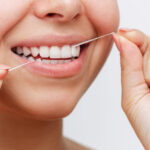Should you be flossing your teeth or not?
 (NaturalHealth365) Did you know that health issues far from your mouth can often be traced back to poor oral hygiene? It’s true – bacteria that linger along your gum line eventually enter your bloodstream, traveling to vital organs like your heart, kidneys, liver, and even your limbs.
(NaturalHealth365) Did you know that health issues far from your mouth can often be traced back to poor oral hygiene? It’s true – bacteria that linger along your gum line eventually enter your bloodstream, traveling to vital organs like your heart, kidneys, liver, and even your limbs.
A recent study presented at the American Stroke Association’s International Stroke Conference 2025 has made this connection even clearer. The research shows that people who floss regularly enjoy better health outcomes, including a healthier heart.
Flossing is the hidden “cheat code” for better health
Flossing might seem tedious – just another task to check off before bed – but this simple habit represents one of best-kept secrets in healthcare. Five minutes of dedicated flossing after dinner creates a protective barrier against life-threatening conditions, substantially reducing your risk of stroke and atrial fibrillation.
When bacteria from your mouth enter your bloodstream, they can trigger inflammation throughout your cardiovascular system. This inflammation contributes to arterial plaque buildup and irregular heart rhythms that significantly increase stroke risk.
What makes flossing particularly powerful is its accessibility. Unlike expensive medications or complicated procedures, this simple habit requires minimal investment while offering potentially life-saving returns. Dr. Souvik Sen, chair of Neurology at Prisma Health Richland Hospital and lead author, emphasized that it’s an affordable intervention available to virtually everyone, regardless of socioeconomic status or healthcare access.
Decades-long study reveals flossing as key stroke prevention tool
The Atherosclerosis Risk in Communities (ARIC) study stands as one of America’s longest-running and most comprehensive health investigations. Since 1987, this research has tracked thousands of participants to understand cardiovascular disease risk factors – including the surprising role of oral hygiene.
Dr. Sen initiated this investigation after discovering the staggering scope of oral health problems worldwide. With oral diseases affecting 3.5 billion people globally in 2022, researchers specifically wanted to identify which oral hygiene practice offered the strongest protection against stroke.
The methodology was rigorous. Researchers distributed structured questionnaires to over 6,000 participants, carefully accounting for confounding factors, including hypertension, diabetes, cholesterol levels, smoking status, BMI, and education. The results were striking – among regular flossers, 4,092 remained stroke-free and 4,050 avoided atrial fibrillation diagnoses throughout the follow-up period.
This longitudinal analysis revealed that:
- 434 participants experienced strokes, of which 147 were larger artery brain clots, 97 were heart-driven clots, and 95 were hardening of smaller arteries
- 1,291 were diagnosed with atrial fibrillation
- Flossers had a 22% lower risk of ischemic stroke
- Flossers had a 44% lower risk of cardioembolic stroke (when blood clots travel from the heart)
- Flossing was linked to a 12% reduced risk of atrial fibrillation
Importantly, these benefits appeared independent of regular brushing or dental visits. The analysis also found that increasing the frequency of flossing had a greater chance of stroke risk reduction, and flossing was associated with a lower chance of cavities and periodontal disease.
How often should you floss?
While daily flossing is ideal, even once-weekly flossing reduces stroke risk from blood clots. Keep floss in your purse, backpack, suitcase, and car to maintain this habit wherever you go.
The researchers were particularly surprised by the reduction in irregular heartbeats, or AFib. As the most common form of irregular heartbeat, AFib can lead to stroke, heart failure, or other cardiovascular complications.
More than 12 million people are projected to have AFib in the United States by 2030, according to the American Heart Association’s 2025 Heart Disease and Stroke Statistics.
Other natural ways to protect your heart and brain health
Flossing isn’t the only habit affecting brain function. Diet, sleep quality, and smoking all play crucial roles.
Quality sleep is essential for brain repair, memory retention, and cognitive function. During deep sleep, your brain clears toxins that contribute to neurodegenerative diseases. Meanwhile, smoking restricts blood flow, reducing oxygen to your brain and accelerating cognitive decline.
Your diet critically impacts brain health, too. Highly processed foods typically lack essential nutrients like healthy fats and amino acids vital for brain function. Prioritize organic whole foods rich in protein, omega-3s, and antioxidants to support your cognitive health and long-term neurological well-being.
Editor’s note: Discover how to eliminate the threat of gum disease, infected root canal treated teeth and other oral health problems, own the Holistic Oral Health Summit created by NaturalHealth365 Programs.
Sources for this article include:



